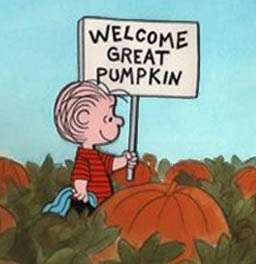It Was Truly a Great Pumpkin

I recently watched “It’s a Great Pumpkin, Charlie Brown,” for the first time in several years, and so this discussion had some resonance for me. Re-watching after a long period also made me more cognizant of the contrast between Halloween Linus and Christmas Linus. If you’ll recall, Linus emerges from the Christmas special as the voice of wisdom, if not authority. He lends intellectual and moral weight to the Christmas program through his reading of Luke 2:8-14, and supports Charlie Brown’s decision to acquire the most pathetic tree available. Although Peanuts deliberately eschews adults, Linus lends an adult presence, someone to ensure that things will turn out right.
This sense of wisdom and competence persists through much of the Halloween special; he uses his blanket to great effect as a tool, speaks with confidence and authority about the Great Pumpkin, and wins the support of at least one convert. Moreover, the other major characters come off either as horrible (Lucy), pathetic (Charlie Brown), or detached (Snoopy). Indeed, the Halloween special doesn’t work unless we have the wise Linus in mind. The idea of the Great Pumpkin seems absurd and destined for failure, until we’re exposed to the confidence and sincerity of the little kind who lent his voice of authority to Christmas. When Linus begins to doubt, we begin to doubt, although even those cracks in his confidence are instructive. We’re not so committed to the realism of Peanuts world to reject the idea that, in this universe, there may be a Great Pumpkin, and we’re primed to suspect that Linus might well be his prophet.
And so it’s a bit of a surprise when the Great Pumpkin fails to arrive, and the conventional wisdom, which proved so wrong at Christmas, proves right at Halloween. And it’s particularly crucial that at the end, Linus seems to have learned nothing from this failure. His response to the (fairly measured) comments of Charlie Brown is to double down, arguing that insufficient sincerity may have been shown this time, but next time the Great Pumpkin will surely appear, rewarding his followers etc. etc. It’s perhaps the classic “if we simply cheer harder, the team will win,” giving us tools to interpret all the similar claims that we’ll encounter. The episode ends with the little boy who gave weight and gravitas to the Christmas special descending into an unhinged rant.
There’s a lesson here, but I think it took me quite a long time to learn it properly. One potential (if obvious) lesson is suspicion of wise men; the one who speaks with authority at Christmas is revealed as a crank at Halloween. But this reading casts too much of a shadow on Christmas Linus, undercutting the entire spirit of the previous special. Maybe I just don’t have the temperament for revolution, but I don’t want the abnegation of authority; the Linus of the Christmas special offers something more than comfort. His comments shed light on the logic of the gathering, and explain to the gathered what’s important about the occasion.
The lesson I’d rather take, I think, is that the wise can be cranks, given the opportunity, and that the same traits that make them wise can make them blind to their own crankery. This creates a new set of dilemmas, both for the wise and for those who would listen to them; the former must sort through an appropriate means of self-examination, while the latter must develop a healthy sense of skepticism, without allowing that sense to become too healthy.
I’ll grant that this is an essentially liberal reading, saving some role for paternalism and authority, while creating a division between appropriate and inappropriate degrees of resistance. Like I suggested, the idea of complete abnegation of authority feels to me like revolution, and leaves me untethered. But I think that there’s something psychologically true about the need for authority; most revolutionaries have their own Linus, and that Linus oft descends into unhinged rants, notwithstanding the wisdom of their commentary on Christmas.


